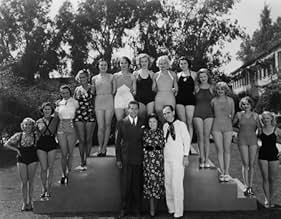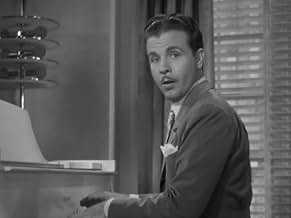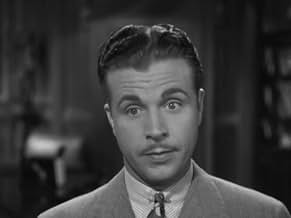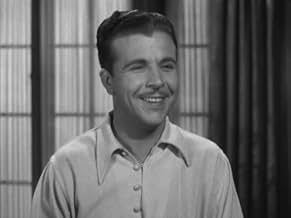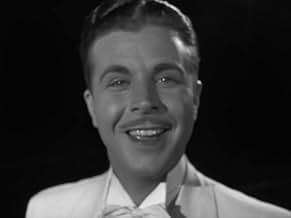NOTE IMDb
6,4/10
1,3 k
MA NOTE
Ajouter une intrigue dans votre langueWhen two investors inform an opportunistic dancer that they can't fund an elderly stage producer's production, she suggests they get an insurance policy on the producer's life.When two investors inform an opportunistic dancer that they can't fund an elderly stage producer's production, she suggests they get an insurance policy on the producer's life.When two investors inform an opportunistic dancer that they can't fund an elderly stage producer's production, she suggests they get an insurance policy on the producer's life.
- Réalisation
- Scénario
- Casting principal
- Nommé pour 1 Oscar
- 2 victoires et 1 nomination au total
Charles D. Brown
- Hugo
- (as Chas. D. Brown)
William B. Davidson
- Andy Callahan
- (as Wm. Davidson)
Bobbie Adams
- Chorus Girl
- (non crédité)
Iris Adrian
- Verna
- (non crédité)
Avis à la une
...from Warner Brothers/First National, director Lloyd Bacon, and dance choreographer/director Busby Berkeley. A group of showgirls, including Norma (Joan Blondell) and Genevieve (Glenda Farrell), grow tired of struggling with poverty, so they set out to change their circumstances. Norma meets insurance salesman Rosmer Peak (Dick Powell), and he gets her a job at his firm. Genevieve falls in with shady theatrical bookkeeper Morty (Osgood Perkins) who's trying to get out from under the debt of theater owner J.J. Hobart (Victor Moore), and who concocts a plan that brings them into contact with Rosmer and Norma.
The musical format had started to change in cinema by this point. Whereas previous films had largely kept musical numbers confined to the stage on which they were ostensibly being shown to the "audience" within the film's narrative, now more and more songs were being performed out "in the world", with characters breaking out into song while walking down the street or sitting in a park. Berkeley's only major number comes at the very end, an elaborate fantasia that is supposedly being viewed by a theater audience but actual defies all physics of reality. It's interesting to look at, but isn't terribly inspired. Dixon, who I'm unfamiliar with, gets a couple of tap-dancing showcases, including one on a giant rocking chair seat. I enjoyed Moore, and I always welcome Blondell and Farrell, but the movie is only passable. Berkeley earned an Oscar nomination for Best Dance Direction. Look out for Carole Landis and Jane Wyman among the chorus girls.
The musical format had started to change in cinema by this point. Whereas previous films had largely kept musical numbers confined to the stage on which they were ostensibly being shown to the "audience" within the film's narrative, now more and more songs were being performed out "in the world", with characters breaking out into song while walking down the street or sitting in a park. Berkeley's only major number comes at the very end, an elaborate fantasia that is supposedly being viewed by a theater audience but actual defies all physics of reality. It's interesting to look at, but isn't terribly inspired. Dixon, who I'm unfamiliar with, gets a couple of tap-dancing showcases, including one on a giant rocking chair seat. I enjoyed Moore, and I always welcome Blondell and Farrell, but the movie is only passable. Berkeley earned an Oscar nomination for Best Dance Direction. Look out for Carole Landis and Jane Wyman among the chorus girls.
GOLD DIGGERS OF 1937 (Warner Brothers, 1936), directed by Lloyd Bacon, is the third musical in the yearly-titled series with the choreography by Busby Berkeley. Released in theaters as a Christmas attraction of 1936, I find it to be a notch below the 1935 edition and no where near as good as the one of 1933, but still acceptable entertainment, highlighted with a show-stopping musical finale.
The story begins at a convention in Atlantic City where Andy Callahan (William B. Davidson) of Good Life Insurance Company tries to encourage his salesmen to go out and sell. Rosmer "Ross" Peek (Dick Powell) and "Boop" Oglethorpe (Lee Dixon, in his feature film debut) are his two top insurance salesmen who lead the men into singing their way to the train station for their destination being New York City. While on the train, Boop becomes acquainted with a Southern gal named Sally (Rosalind Marquis); Ross meets up with Norma Perry (Joan Blondell), a stranded showgirl accompanied by Genevieve Larkin (Glenda Farrell), who in turn meets Monty Wethered (Osgood Perkins, father of Anthony Perkins), a crooked backer of JJ Hobart Productions. Rosmer helps Norma by offering her a position as his secretary at the insurance firm. As for Genevieve, she joins forces with Monty's assistant, Mr. Hugo (Charles D. Brown), another chiseler who has pocketed and lost most of Hobart's investments. They want to get the 59-year-old theatrical bachelor producer, JJ Hobart (Victor Moore) to take on an insurance policy by having Genevieve arrange to have Norma get Ross to meet up with him. After Hobart passes the million dollar insurance policy physical with Ross hired as his agent, Monty and Hugo try their best to see that Hobart meets with an "accident." But when all else fails, Hobart eventually does land in the hospital after Genevieve has a change of heart and tells him the truth. It is then up to the younger crowd, who feel that Hobart might die, to do away with the crooks Monty and Hugo and help put Hobart's upcoming show together.
Songs featured include: "The Life Insurance Song," "Speaking of the Weather" and "Let's Put Our Heads Together" By E.Y. Harburg and Harold Arlen; "With Plenty of Money and You" and "All's Fair in Love and War" by Harry Warren and Al Dubin. Dick Powell, with his pencil-thin mustache, sings "With Plenty of Money and You" before the opening titled cast and credits. He reprises the hit money song to Blondell later on in the story as he accompanies her home from their dinner date. "Speaking of the Weather" also gets to be heard twice, first in the insurance office sung by Powell to Blondell, later sung by guests at the pool and garden party with Lee Dixon doing his "puppet on a string" tap-dancing solo. Also sung during the party sequence is "Let's Put Our Heads Together" (a pretty tune introduced by Powell). Of the songs presented, "All's Fair in Love and War" is the only number not part of the storyline. It's a ten minute staged production, part of the JJ Hobart Revue, compliments of Busby Berkeley and his display of chorus girls marching in military fashion and flag waving. This well choreographed finale was nominated for Best Dance Direction, and one of the few highlights of the film.
Victor Moore, a pudgy bald character actor of numerous comedies, comes off best here. Besides being an amusing comedian whose catch phrase if, "Life begins at 59," the scene that stands out most is the moment he gets sentimental in telling gold-digger Genevieve (Farrell) of he being a lonely old man of the theater whose life has now been fulfilled by her presence in making him feel young again, and now wanting to marry her. Even Farrell manages to present herself as a gold-digger with a heart of gold, and she carries this particular scene well without making it appear silly. As for Powell, his character at times appears to be more foolish than funny, but makes up for it during the romantic and singing spots.
THE GOLD DIGGERS OF 1937 became available on DVD in 2008, and can bee seen broadcast on Turner Classic Movies. Look fast for a young Jane Wyman in the early portion of the movie with one line, "Happy days are here again" as she and other show girls watch a parade of insurance men entering the train, and Susan Fleming (Mrs. Harpo Marx) in a small role as a secretary billed as Lucille. (***)
The story begins at a convention in Atlantic City where Andy Callahan (William B. Davidson) of Good Life Insurance Company tries to encourage his salesmen to go out and sell. Rosmer "Ross" Peek (Dick Powell) and "Boop" Oglethorpe (Lee Dixon, in his feature film debut) are his two top insurance salesmen who lead the men into singing their way to the train station for their destination being New York City. While on the train, Boop becomes acquainted with a Southern gal named Sally (Rosalind Marquis); Ross meets up with Norma Perry (Joan Blondell), a stranded showgirl accompanied by Genevieve Larkin (Glenda Farrell), who in turn meets Monty Wethered (Osgood Perkins, father of Anthony Perkins), a crooked backer of JJ Hobart Productions. Rosmer helps Norma by offering her a position as his secretary at the insurance firm. As for Genevieve, she joins forces with Monty's assistant, Mr. Hugo (Charles D. Brown), another chiseler who has pocketed and lost most of Hobart's investments. They want to get the 59-year-old theatrical bachelor producer, JJ Hobart (Victor Moore) to take on an insurance policy by having Genevieve arrange to have Norma get Ross to meet up with him. After Hobart passes the million dollar insurance policy physical with Ross hired as his agent, Monty and Hugo try their best to see that Hobart meets with an "accident." But when all else fails, Hobart eventually does land in the hospital after Genevieve has a change of heart and tells him the truth. It is then up to the younger crowd, who feel that Hobart might die, to do away with the crooks Monty and Hugo and help put Hobart's upcoming show together.
Songs featured include: "The Life Insurance Song," "Speaking of the Weather" and "Let's Put Our Heads Together" By E.Y. Harburg and Harold Arlen; "With Plenty of Money and You" and "All's Fair in Love and War" by Harry Warren and Al Dubin. Dick Powell, with his pencil-thin mustache, sings "With Plenty of Money and You" before the opening titled cast and credits. He reprises the hit money song to Blondell later on in the story as he accompanies her home from their dinner date. "Speaking of the Weather" also gets to be heard twice, first in the insurance office sung by Powell to Blondell, later sung by guests at the pool and garden party with Lee Dixon doing his "puppet on a string" tap-dancing solo. Also sung during the party sequence is "Let's Put Our Heads Together" (a pretty tune introduced by Powell). Of the songs presented, "All's Fair in Love and War" is the only number not part of the storyline. It's a ten minute staged production, part of the JJ Hobart Revue, compliments of Busby Berkeley and his display of chorus girls marching in military fashion and flag waving. This well choreographed finale was nominated for Best Dance Direction, and one of the few highlights of the film.
Victor Moore, a pudgy bald character actor of numerous comedies, comes off best here. Besides being an amusing comedian whose catch phrase if, "Life begins at 59," the scene that stands out most is the moment he gets sentimental in telling gold-digger Genevieve (Farrell) of he being a lonely old man of the theater whose life has now been fulfilled by her presence in making him feel young again, and now wanting to marry her. Even Farrell manages to present herself as a gold-digger with a heart of gold, and she carries this particular scene well without making it appear silly. As for Powell, his character at times appears to be more foolish than funny, but makes up for it during the romantic and singing spots.
THE GOLD DIGGERS OF 1937 became available on DVD in 2008, and can bee seen broadcast on Turner Classic Movies. Look fast for a young Jane Wyman in the early portion of the movie with one line, "Happy days are here again" as she and other show girls watch a parade of insurance men entering the train, and Susan Fleming (Mrs. Harpo Marx) in a small role as a secretary billed as Lucille. (***)
A nostalgic look at the old-fashioned (and very corny) musicals of the '30s produced by WB is the only reason for viewing this oldie with Dick Powell and Joan Blondell. Not even the veteran scene-stealer Victor Moore is able to salvage the silly plot nor the shenanigans of the scheming Glenda Farrell.
The weak excuse for a story is all about being able to put on a Broadway show--namely, getting the money to fund it. When the show finally does get staged, it's done in Busby Berkeley style with camera effects that couldn't possibly be duplicated in a real stage show--including trick special effects. But of course, all logic disappeared when watching musicals such as this in the '30s and depression weary audiences probably couldn't have cared less.
One of the crafty villains Morty Wethered (Osgood Perkins) is played by Anthony Perkins' father. And if you look real fast, you can spot Jane Wyman who has one line to speak as a chorus girl.
The tunes are nothing to shout about but "Speaking of the Weather" is done in charming style with Powell and Blondell in a rainy day office scene and later reprised during the poolside sequence. "All's Fair In Love and War" is the big finale--but ultimately the viewer is left with the feeling that this has all been done before and with better results in previous "Gold Digger" films. Most earnest emoting in the film is done by Dick Powell who breezed through his Warner musicals with confidence and charm.
The weak excuse for a story is all about being able to put on a Broadway show--namely, getting the money to fund it. When the show finally does get staged, it's done in Busby Berkeley style with camera effects that couldn't possibly be duplicated in a real stage show--including trick special effects. But of course, all logic disappeared when watching musicals such as this in the '30s and depression weary audiences probably couldn't have cared less.
One of the crafty villains Morty Wethered (Osgood Perkins) is played by Anthony Perkins' father. And if you look real fast, you can spot Jane Wyman who has one line to speak as a chorus girl.
The tunes are nothing to shout about but "Speaking of the Weather" is done in charming style with Powell and Blondell in a rainy day office scene and later reprised during the poolside sequence. "All's Fair In Love and War" is the big finale--but ultimately the viewer is left with the feeling that this has all been done before and with better results in previous "Gold Digger" films. Most earnest emoting in the film is done by Dick Powell who breezed through his Warner musicals with confidence and charm.
Dick Powell is an insurance salesman who sells a million dollar policy to a producer in "Gold Diggers of 1937" also starring Joan Blondell, Victor Moore, Osgood Perkins and Glenda Farrell.
Due to bad investments by his staff, producer/hypochondriac Hobart (Moore) has no idea that the show he's planning to put on can't be financed. The men responsible for losing his money get Rosmer (Powell), an insurance salesman, to sell Hobart a $1 million policy, figuring he won't live and then the show can be done.
The funniest part of the movie is when Rosmer tells his fellow insurance salesmen of his coup and then announces that Hobart is 59. "59!" one of them exclaims. "He'll never pass the physical." "We sold a policy to a 68-year-old last year," someone says, "and he passed." "Yeah," the reply is, "passed OUT."
Interesting that 59 was thought of as more than 79 in the '30s. Coincidentally, Dick Powell himself died at the age of 59.
It's Rosmer's job to keep Hobart alive and it's his partners' job to help him to the pearly gates. They send in Glenda Farrell to break his heart, figuring he'll want to end it all, but things don't work out as they planned.
They throw him in a pool at a party; he doesn't catch cold, nor does he drown. It's actually pretty funny.
There are some pleasant songs which Powell sings beautifully, and a big Busby Berkeley number at the end, but I imagine as this is part of a series of "Gold Digger" films, audiences wanted something more.
The performances are good - chameleon Powell is a great, earnest salesman, Joan Blondell (who was either Powell's wife or about to become his wife) is adorable as a showgirl, and Moore is hilarious. Glenda Farrell is a real scene-stealer with her great line delivery.
Pleasant but not much as far as musical values.
Due to bad investments by his staff, producer/hypochondriac Hobart (Moore) has no idea that the show he's planning to put on can't be financed. The men responsible for losing his money get Rosmer (Powell), an insurance salesman, to sell Hobart a $1 million policy, figuring he won't live and then the show can be done.
The funniest part of the movie is when Rosmer tells his fellow insurance salesmen of his coup and then announces that Hobart is 59. "59!" one of them exclaims. "He'll never pass the physical." "We sold a policy to a 68-year-old last year," someone says, "and he passed." "Yeah," the reply is, "passed OUT."
Interesting that 59 was thought of as more than 79 in the '30s. Coincidentally, Dick Powell himself died at the age of 59.
It's Rosmer's job to keep Hobart alive and it's his partners' job to help him to the pearly gates. They send in Glenda Farrell to break his heart, figuring he'll want to end it all, but things don't work out as they planned.
They throw him in a pool at a party; he doesn't catch cold, nor does he drown. It's actually pretty funny.
There are some pleasant songs which Powell sings beautifully, and a big Busby Berkeley number at the end, but I imagine as this is part of a series of "Gold Digger" films, audiences wanted something more.
The performances are good - chameleon Powell is a great, earnest salesman, Joan Blondell (who was either Powell's wife or about to become his wife) is adorable as a showgirl, and Moore is hilarious. Glenda Farrell is a real scene-stealer with her great line delivery.
Pleasant but not much as far as musical values.
Gold Diggers of 1933 was a terrific film with some of Busby Berkeley's best material. Gold Diggers of 1935 was almost as good too, but this was a little disappointing. Apart from the cracking final number All's Fair in Love and War Berkeley's choreography lacks excitement and has a rather toned down feeling to it(censorship no doubt had something to do with it). While it still looks quite nice, it's nicely shot and the costumes are well-tailored, there is also a sense with the less-than-grand sets and how some scenes are staged that there was a lack of budget. Dick Powell sings beautifully and has a charming appearance but can have a tendency to be a little too sappy and wooden here. The songs are very nice and catchy still, Speaking of the Weather is charming and All's Fair in Love and War is catchy and in all respects the highlight of the film. There's plenty of snappy dialogue to savour also, and while with some silly moments the plot is actually pretty decent and paced well. The performances compliment the film nicely, Victor Moore is very funny and wonderfully cranky, Joan Blondell still charms even when in more subdued mode and Glenda Farrell is deliciously sassy, coming this close to stealing the film whenever she appears. All in all, disappointing but still enjoyable. 7/10 Bethany Cox
Le saviez-vous
- AnecdotesMultiple references to 'carloadings' being up, meaning an increase in the total amount of goods shipped by railroad. Back before stores and other businesses reported total monthly sales, carloadings was the best available measure of consumer spending.
- Gaffes(at around 20 min) A string used to make a stack of books fall onto Dick Powell's head is clearly visible against the white paper background.
- Citations
Rosmer Peak: Would you call Andy if I kiss you?
Norma Perry: Not unless you want to kiss him too.
- Crédits fousThe usual disclaimer goes to great lengths to assure us that "The names of all characters -- The characters themselves -- The story - all incidents and institutions portrayed in this production are fictitious -- And no identification with actual persons, living or deceased, is intended or should be inferred."
- Versions alternativesThere is an Italian edition of this film on DVD, distributed by DNA srl, "VIVA LE DONNE! (1933) + AMORE IN OTTO LEZIONI (1936)" (2 Films on a single DVD), re-edited with the contribution of film historian Riccardo Cusin. This version is also available for streaming on some platforms.
- ConnexionsEdited into Busby Berkeley and the Gold Diggers (1969)
- Bandes originalesWith Plenty of Money and You
(1936)
Music by Harry Warren
Lyrics by Al Dubin
Sung by Dick Powell (uncredited)
Meilleurs choix
Connectez-vous pour évaluer et suivre la liste de favoris afin de recevoir des recommandations personnalisées
- How long is Gold Diggers of 1937?Alimenté par Alexa
Détails
- Date de sortie
- Pays d’origine
- Langue
- Aussi connu sous le nom de
- Gold Diggers of 1937
- Lieux de tournage
- Société de production
- Voir plus de crédits d'entreprise sur IMDbPro
- Durée1 heure 41 minutes
- Couleur
- Mixage
- Rapport de forme
- 1.37 : 1
Contribuer à cette page
Suggérer une modification ou ajouter du contenu manquant



